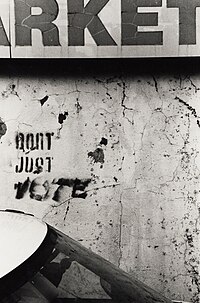Selected Anarchism-related content Anarchism is a political philosophy and movement that is against all forms of authority and seeks to abolish the institutions it claims maintain unnecessary coercion and hierarchy, typically including the state and capitalism. Anarchism advocates for the replacement of the state with stateless societies and voluntary free associations. A historically left-wing movement, anarchism is usually described as the libertarian wing of the socialist movement (libertarian socialism). Although traces of anarchist ideas are found all throughout history, modern anarchism emerged from the Enlightenment. During the latter half of the 19th and the first decades of the 20th century, the anarchist movement flourished in most parts of the world and had a significant role in workers' struggles for emancipation. Various anarchist schools of thought formed during this period. Anarchists have taken part in several revolutions, most notably in the Paris Commune, the Russian Civil War and the Spanish Civil War, whose end marked the end of the classical era of anarchism. In the last decades of the 20th and into the 21st century, the anarchist movement has been resurgent once more, growing in popularity and influence within anti-capitalist, anti-war and anti-globalisation movements. (Full article...)
Selected article
From Bakunin to Lacan: Anti-Authoritarianism and the Dislocation of Power is a 2001 book on political philosophy by Saul Newman. It investigated the essentialist elements of anarchist theory, and by utilising concepts from post-structuralist thought sought to move beyond the limitations of classical anarchism. Newman's was a more substantive account of post-anarchism than previous efforts, and influenced later approaches to the philosophy. Released in a climate of an anarchist movement hostile to postmodern philosophy, From Bakunin to Lacan was criticised for its poor understanding of and engagement with contemporary anarchism. (read more...)
Selected image Stenciled graffito in Washington D.C. bearing the slogan of CrimethInc.'s 2004 Don't Just Vote campaign, which exhorted voters to expand their political advocacy beyond voting to direct action. Image courtesy of the Brian MacKenzie Infoshop. CrimethInc. argued that "[v]oting for people to represent your interests is the least efficient and effective means of applying political power. The alternative, broadly speaking, is acting directly to represent your interests yourself." This posture is typical of anarchism's historical anti-electoralism. Did you know?
Selected quoteAnniversaries for November 24Relevant listsCategoriesRelated portalsParent portals Socio-political portals Related WikiProjectsParent projects
Economics · Philosophy Socio-political projects Anarchism TopicsThings you can doThank you for your interest in improving the coverage of anarchism on Wikipedia!
Related WikimediaThe following Wikimedia Foundation sister projects provide more on this subject:
Discover Wikipedia using portals |























